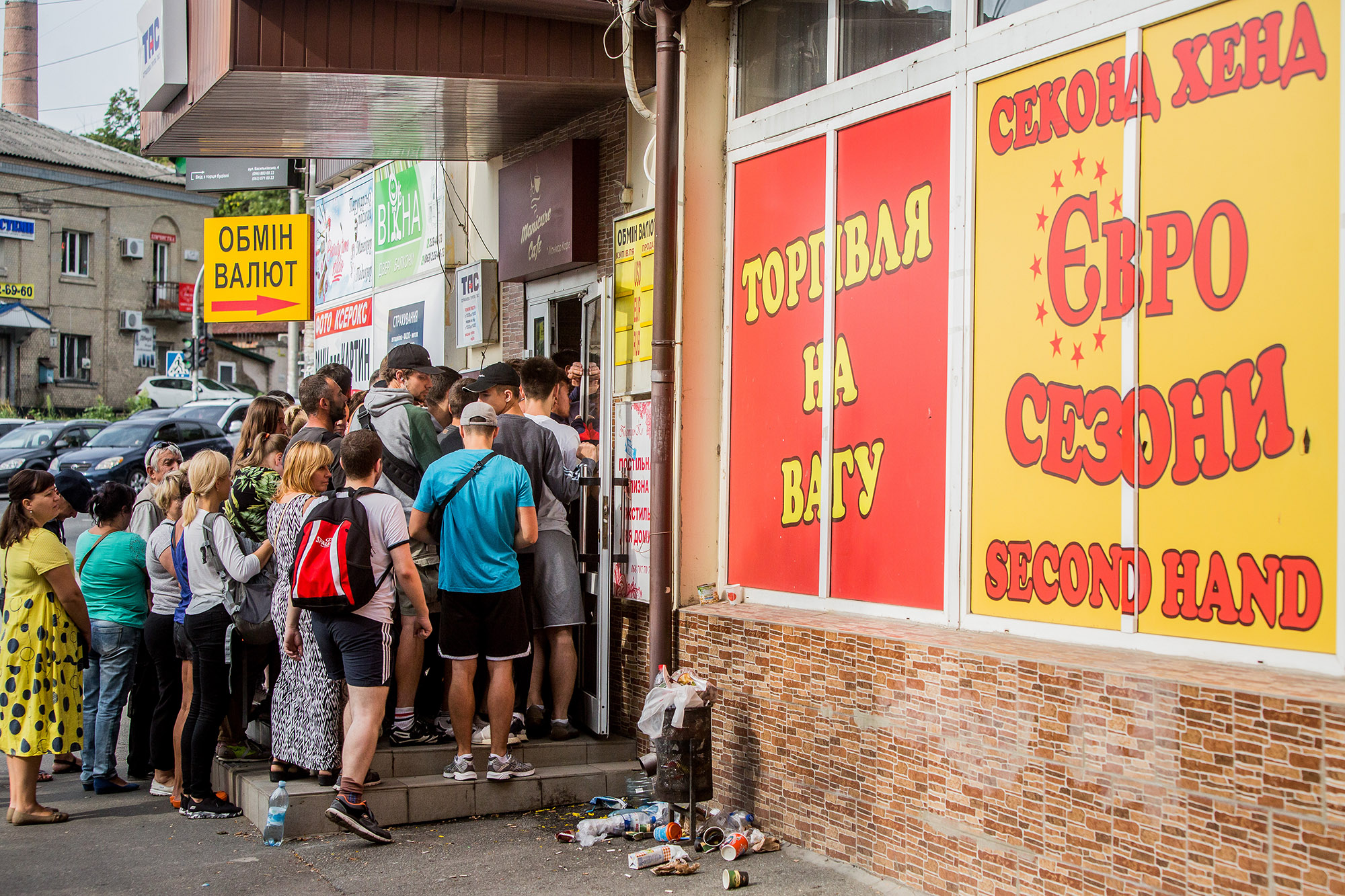
The Early Bird Gets the Nikes
In one of his interviews, Kurt Cobain mentions that he likes going to second-hand stores. “It’s more special to you,” he says. “Rather than, you know, having a thousand dollars and going into a store like that and just buying the whole store.” Recently, the lead singer of Nirvana has been gaining more and more like-minded thinkers. On the one hand, there is a worldwide trend toward conscious consumption. On the other, the average Ukrainian crucified between the price tag at a brand-name store and one-time-use “Abibas” from China, increasingly prefers inexpensive and high-quality things, even if they are used.
Everyone finds something at the thrift store. For some this might be where the family goes to shop; others might just go in to kill some time. Some people find that digging in the multicolored mountains of rags acts as an antidepressant. But they’re all amateurs. Professionals long ago figured out how to turn the second-hand store into their daily bread. A buyer with five years’ experience is going to tell me just how often this bread comes with butter and how to survive delivery day at the thrift store.
8:59 am. One more minute. Everyone is concentrated and quiet. It stinks of sweat and asphalt. The head of the line has firmly dug its fangs into the entrance; only the tail swings from side to side in an attempt to find a less helpless starting position. Roman’s elbows are pressed tightly against his ribs; his chin is at his chest. I do the same.
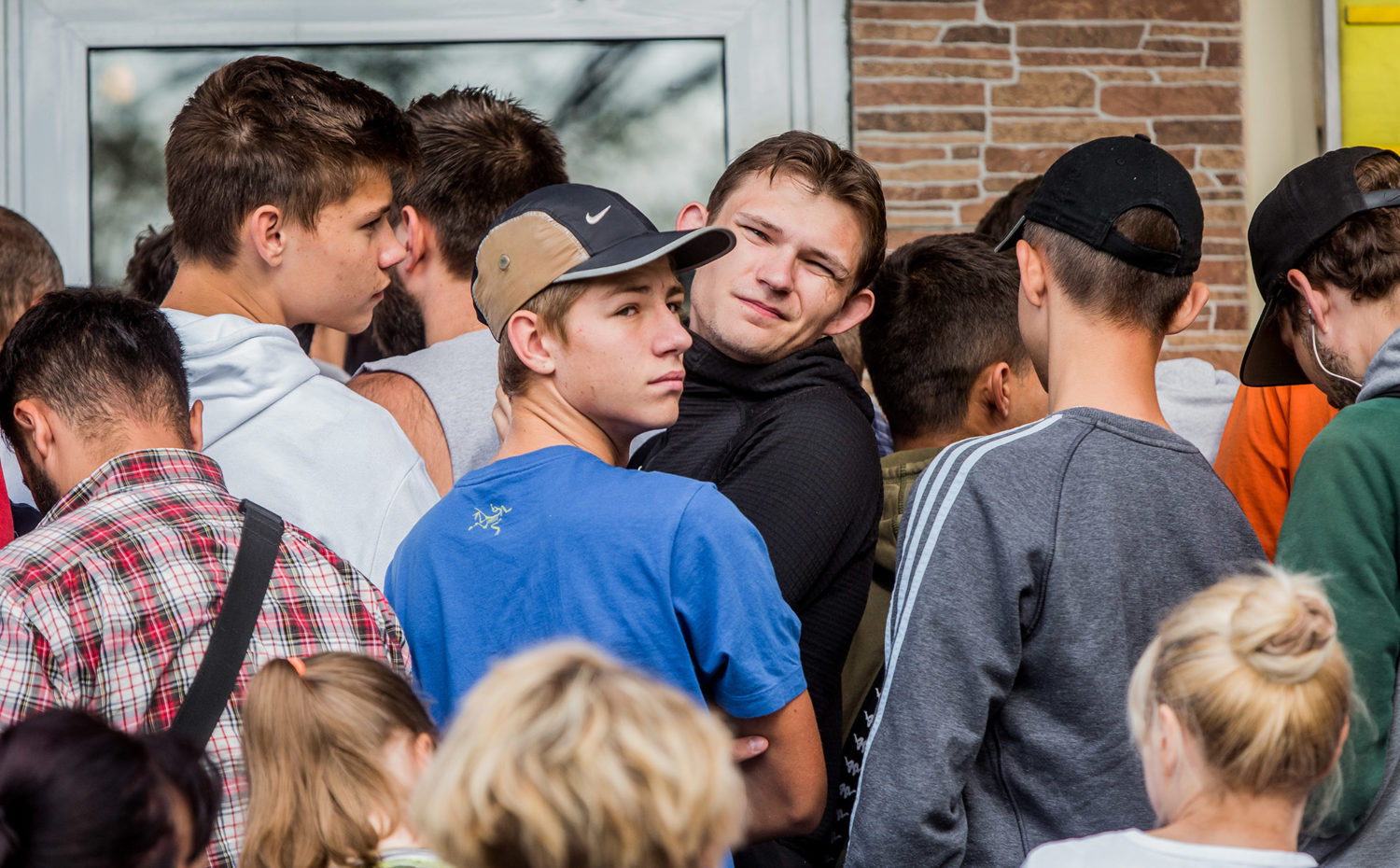
“You’re doing that right,” he says. “Last time they broke a dude’s collarbone.”
“You’re kidding! It’s that…”
“You’re about to see.”
Through the glass, we can see the guard approach the door. He inserts the key into the lock, turns it, and barely manages to jump out of the way.
8:00 am. Tall, bony, and slim. There is something Gothic about his appearance. Furthermore, the combination of his broad shoulders and narrow waist makes him look like a Maasai warrior from the encyclopedia. This African impression only gets stronger when Roman ascends the motionless escalator at the subway entrance where we agreed to meet in a dozen enormous leaps.
“Wassup!” he tugs on the hood of my sweatshirt. “You might as well be in a three-piece suit.”
“Is something wrong?”
“You’ll see. Jeans are fine, but the fucking hood is too much. They’ll tear it off along with your head.”
Roman is dressed in a fitted fleece jacket and hiking pants with innumerable pockets Wasserman would love. He is wearing sneakers. At least I didn’t mess that up.
We slowly make our way toward the thrift store. Some white collars carrying pleather attaché cases are hurrying toward us to the subway.
The shop is located on the first floor of a Khrushchevka apartment building. The yellow “Euro Second Hand” letters on the red background make the sign stand out harshly against the gray facade. The combination of colors and the letter Є surrounded by a circle of stars resemble the flag of the People’s Republic of China.
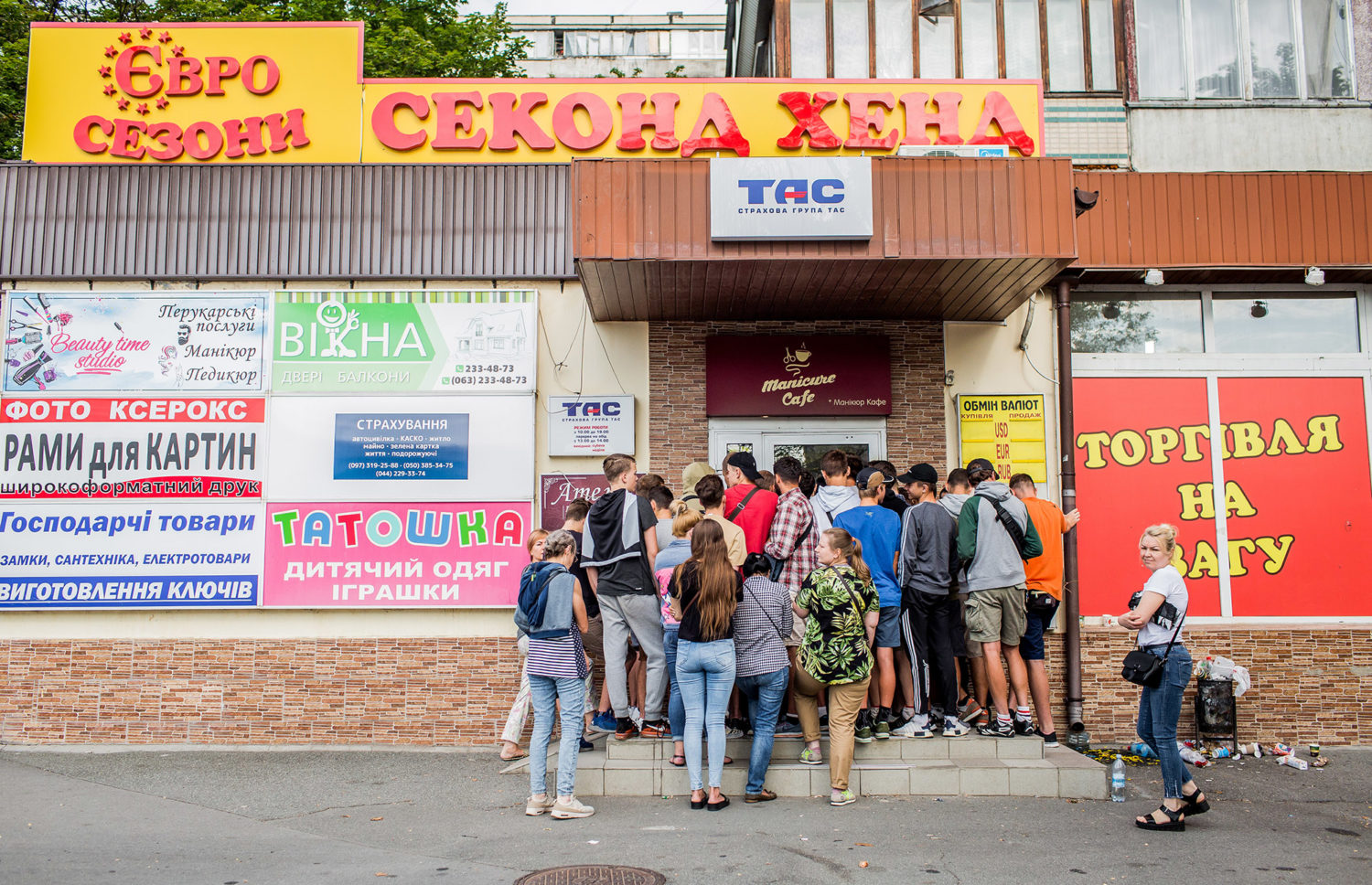
There are no price tags at this thrift store; things are sold by weight. Delivery day, Tuesday, is the most expensive—220 hryvnias per kilo. Tomorrow a kilogram will be thirty hryvnias cheaper. They get cheaper as the week goes on until by Monday the price is a ridiculous 20 per kilo. The stock is updated once a week.
We’re not first. There are three guys with severe haircuts sitting on the steps. From a distance, Roman greets them with a brief nod; they respond with even briefer ones. Cold and unfriendly.
“Do you know them?”
“They’re dealers just like me.”
“Competition?”
“Uh-huh. But not exactly. It depends.”
The buyers have some kind of a métier. Roman’s territory is hiking clothes and shoes: hiking boots, membrane jackets, ski pants, backpacks, sleeping bags. Even special socks. These guys, on the other hand, are interested in all kinds of streetwear specialties: Barbour hats, Ellesse t-shirts, Stone Island jackets. But they’re not above Hilfiger, Ralph Lauren, or some other fashionable Lacoste.
“The dealers split into pragmatists and fanatics,” Roman explains. “I’m a pragmatist. For me thrift stores are just work. Buy low and sell high. I’m not sentimental about this activity; it’s merely a practical interest. But for these dudes it’s something more.”
A whole scene, a subculture, a caste has sprung up around the thrift store. As a rule, these are guys from the local Thai kickboxing school, the community college, and even losers from school. There are also elders of the profession, and some have become legends
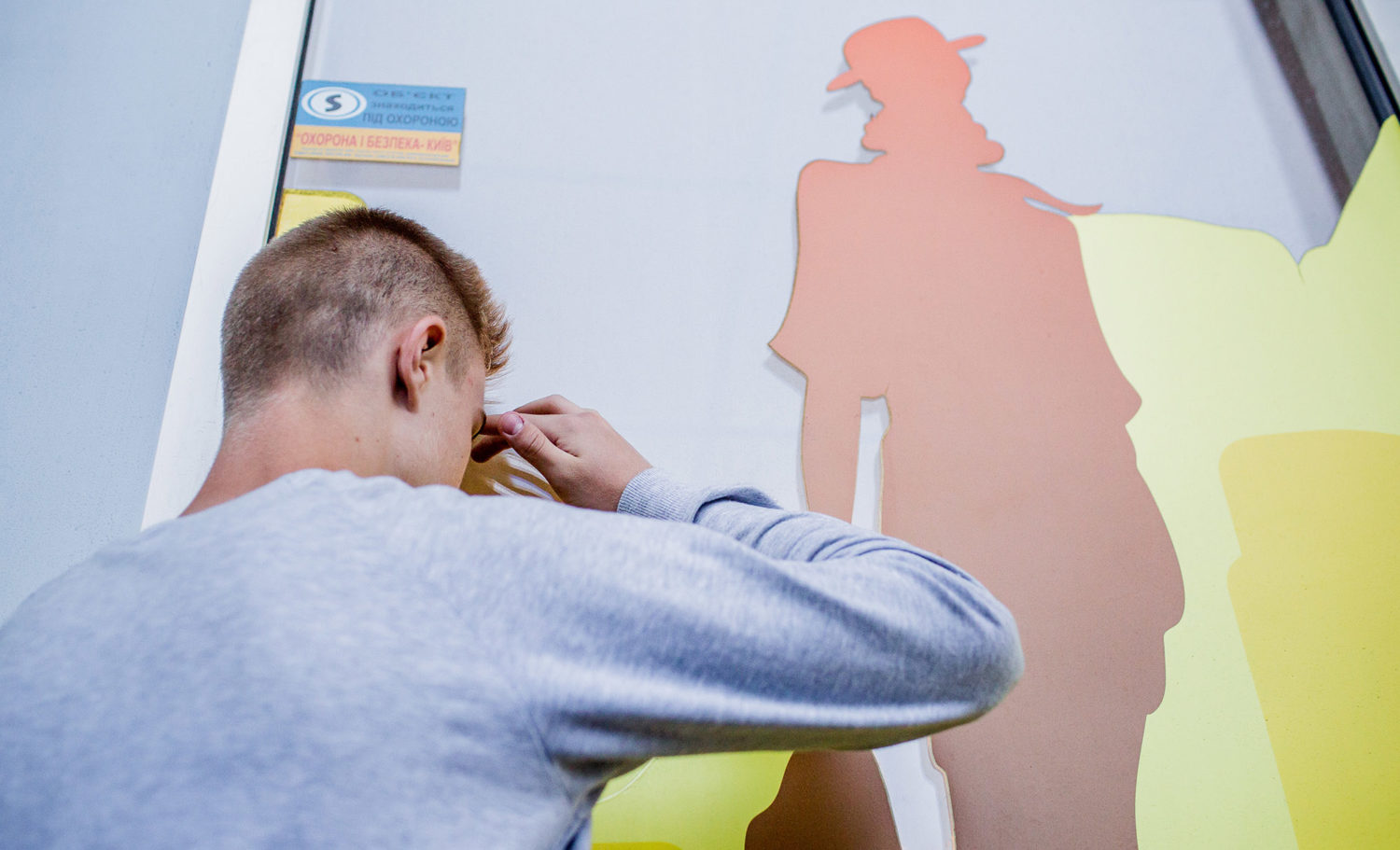
A whole scene, a subculture, a caste has sprung up around the thrift store. As a rule, these are guys from the local Thai kickboxing school, the community college, and even losers from school. There are also elders of the profession, and some have become legends. A few have even generated followers, something like a school. On the social media pages “Sweet Find” and “Thoughts from Top-Notch Ukrainian Hustlers,” dealers share the secrets of the trade and their professional achievements. For them, Stone Island is no less an object of pride and general envy than the latest iPhone for their wealthier peers. Vintage clothes are another story. Last century’s Berghaus has no particular value anywhere except for in the scene. The guys sell it to each other and wear it themselves. The circulation of such vintage specialties among those in the know rarely goes beyond the scene.
“Fuck, Dimas found a blow-up doll last time,” a friend who has just arrived tells the guys.
“Big deal, one time I found a parachute.”
“Fuck, no shit?”
“No fucking shit!”
Trying to reduce their three outfits to a common denominator, I arrive at a composite sketch: New Balance sneakers, a North Face windbreaker, a black cap rolled up over their bald heads echoes the cuffs on their dark blue Levi’s. The national dress of a dealer. A hybrid of a soccer ultra, a freight handler, and mountain climber with an obvious preference for boldness.
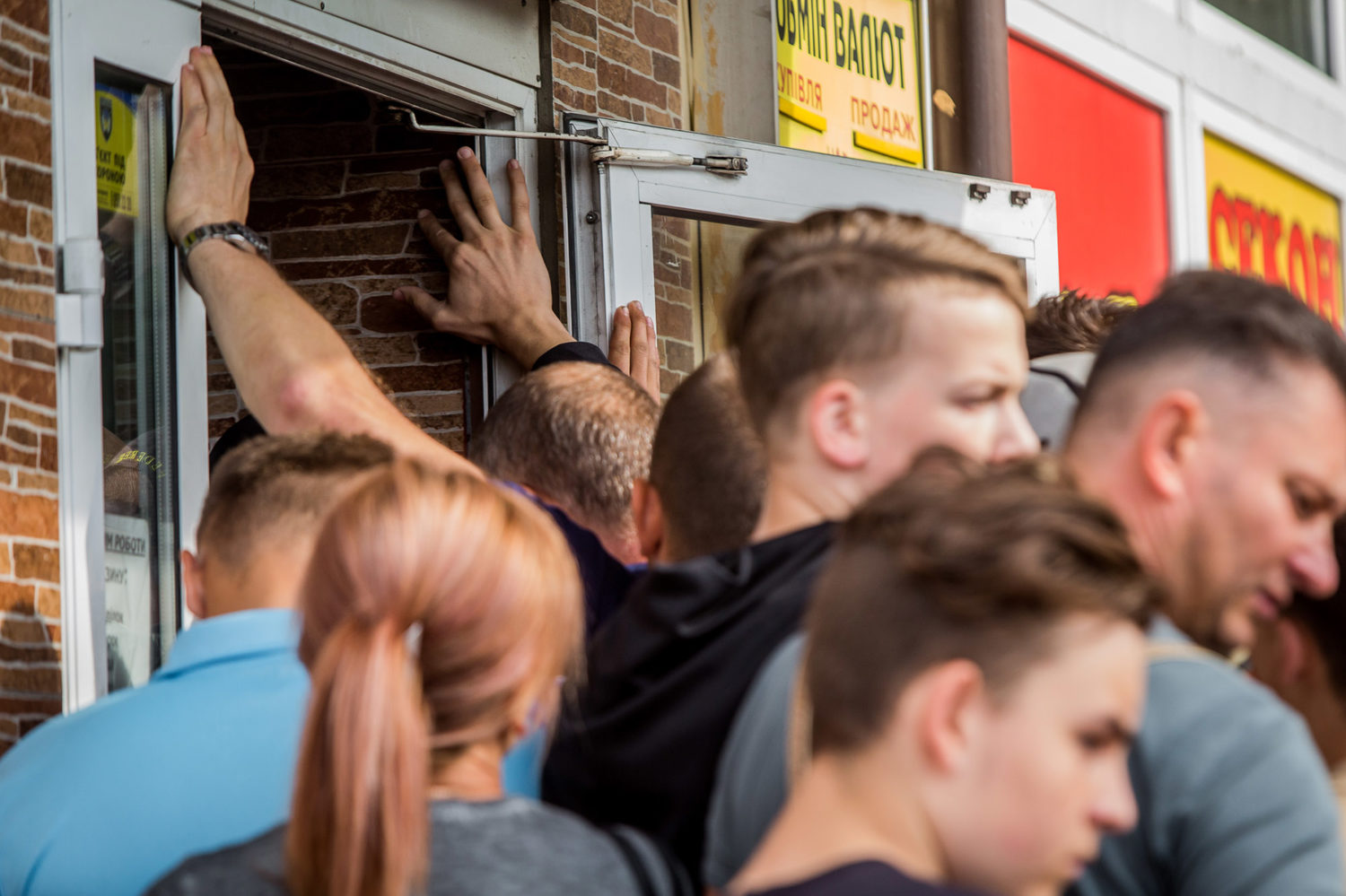
“How come they’re so early?” I ask. “There’s still almost an hour.”
“An hour isn’t early. See that?” Roman points to the car with Euro plates near the entrance. “They’ve been sitting there since 5 am if not since last night. The strategy is simple. Two or three come and hold spots in line for a dozen. You can do that.”
“Have you tried getting here earlier like them?”
Of course Roman has tried. In order to be first in line, he has even spent the night outside the thrift store.
“How do you do it? You take the last subway, lay out your sleeping pad, climb in your sleeping bag, and sleep.”
“Wasn’t it scary?”
“Why would it be scary? It could be some bum sleeping, just let him sleep. Who’d bother?”
Not far away they’re repairing the road. The machinery hums and gusts of wind carry the smell of asphalt. People gradually start arriving. I take a look at the Euro Second Hand sign. We’ve got Euro-doors, Euro-windows, and Euro-remodeling—in my country, the prefix “Euro” in the name of wares or services is something akin to the USSR’s GOST quality standard. I remember how, walking around Kyiv, a friend of mine from England was surprised by the dominance of EU flags on the streets of a country that’s not even a member. I told her it was our political talisman.
“One time my sneakers fell apart. Things were tight with money—I had lost my stipend the previous semester. There was this guy in my dorm selling stuff. So I asked if I could go with him to the delivery. I liked it so I started going,” Roman recounts how it all began.
The first thing he sold was an Everest windbreaker. He netted 456 hryvnias.
“And then I thought, that if I sold two jackets like that a week I wouldn’t need a job. The earnings were the same, but I’d have so much free time. So I quit my office job where I was lying to future students about history.”
8:20 am. A diverse crowd is showing up. It’s like a Vertep Christmas play: an old biddy, a dude tattooed from tip to toe, a pregnant sixteen-year-old. Two high schoolers argue for a long time and ultimately decide to leave their school bags in the lockers at the ATB grocery store next door. The porch in front of the store is filling with idle chit-chat and cigarette smoke.
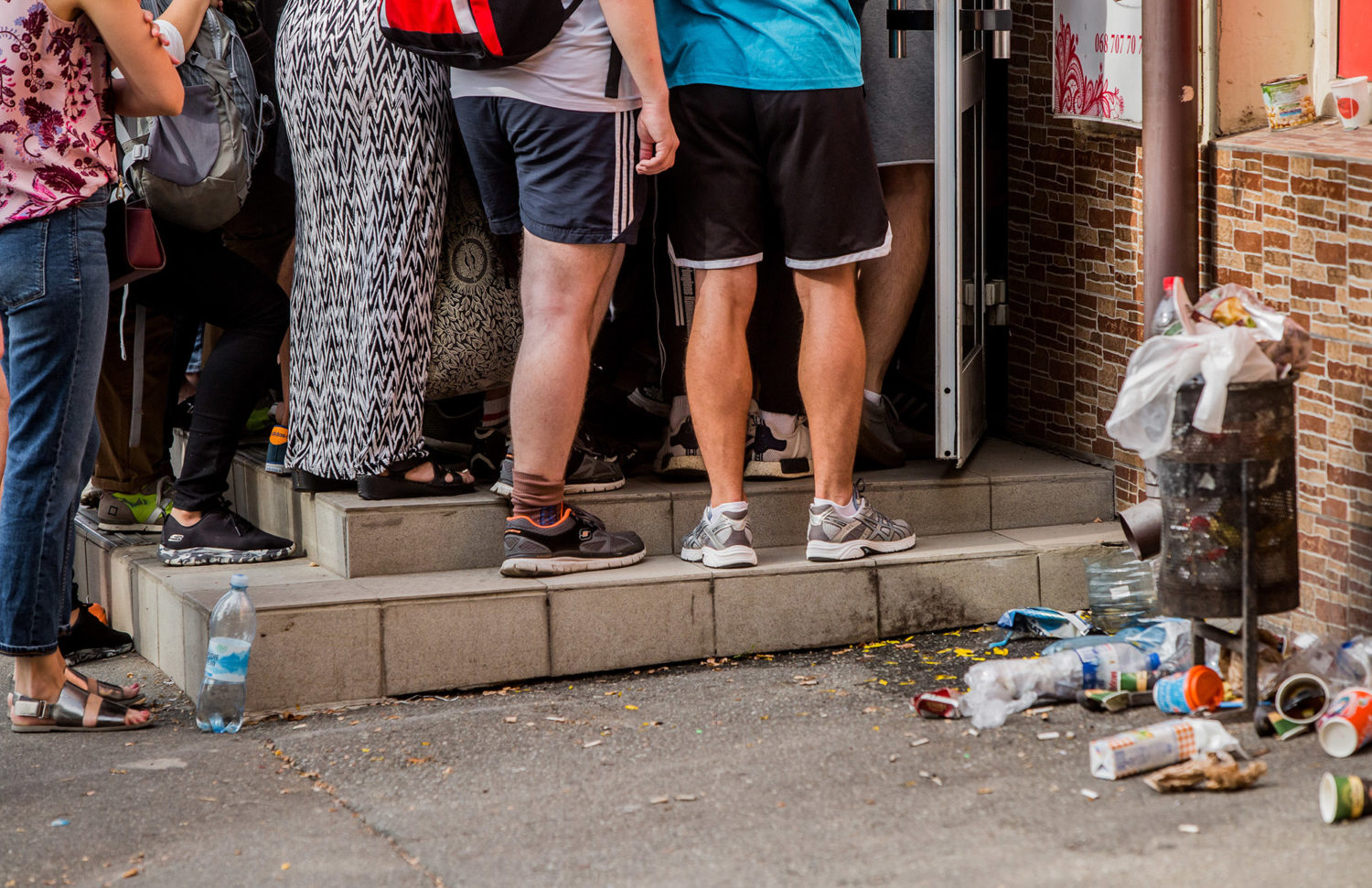
Roman says he’s seen the drummer from the BRUTTO band at Kyiv thrift stores a few times.
A couple comes up to us. They’re both around 30. Their travelling hobby stands out a mile.
“So how was Mount Elbrus?” they ask Roman.
“Just like Hoverla, but not Hoverla.”
Olia and Sasha are displaced people from the Luhansk region. They decided to work the thrift stores after suffering at the hands of Kyiv employers. Theirs is a family business. He takes care of men’s clothes, and she does women’s. This is how they make their living. Besides direct competition, they and Roman are united by their love for mountains. It’s hard to tell what’s stronger.
It is easy to tell the casual passers-by from the professionals. They don’t know anyone, so they don’t talk to anyone. They are nervous and confused. They’re wearing uncomfortable clothes, just like me. The professionals circle up, laugh loudly, and share the latest news. They’re all wearing sneakers.
“There are a lot of interesting characters here,” Roman says. “You see that fat woman and the girl with her? That’s Maryna and her daughter. She used to be married to a businessman. She wanted to study, but he wouldn’t let her. ‘Sit at home, take care of the child, I’ll take care of all the expenses’. And he really did. But a few years ago he found himself a slut and left the family. Maryna has no education, no profession, and no work experience. At least he left her the apartment. So she and her daughter deal in clothes.”
I ask Roman how the resale happens.
“Mainly online. Some people sell on OLX, others like other platforms. My friends and I have a group on VKontakte. We send the goods by Nova Poshta courier or you can pick them up. In certain cases, when the price is right, I can even deliver it to your door.”
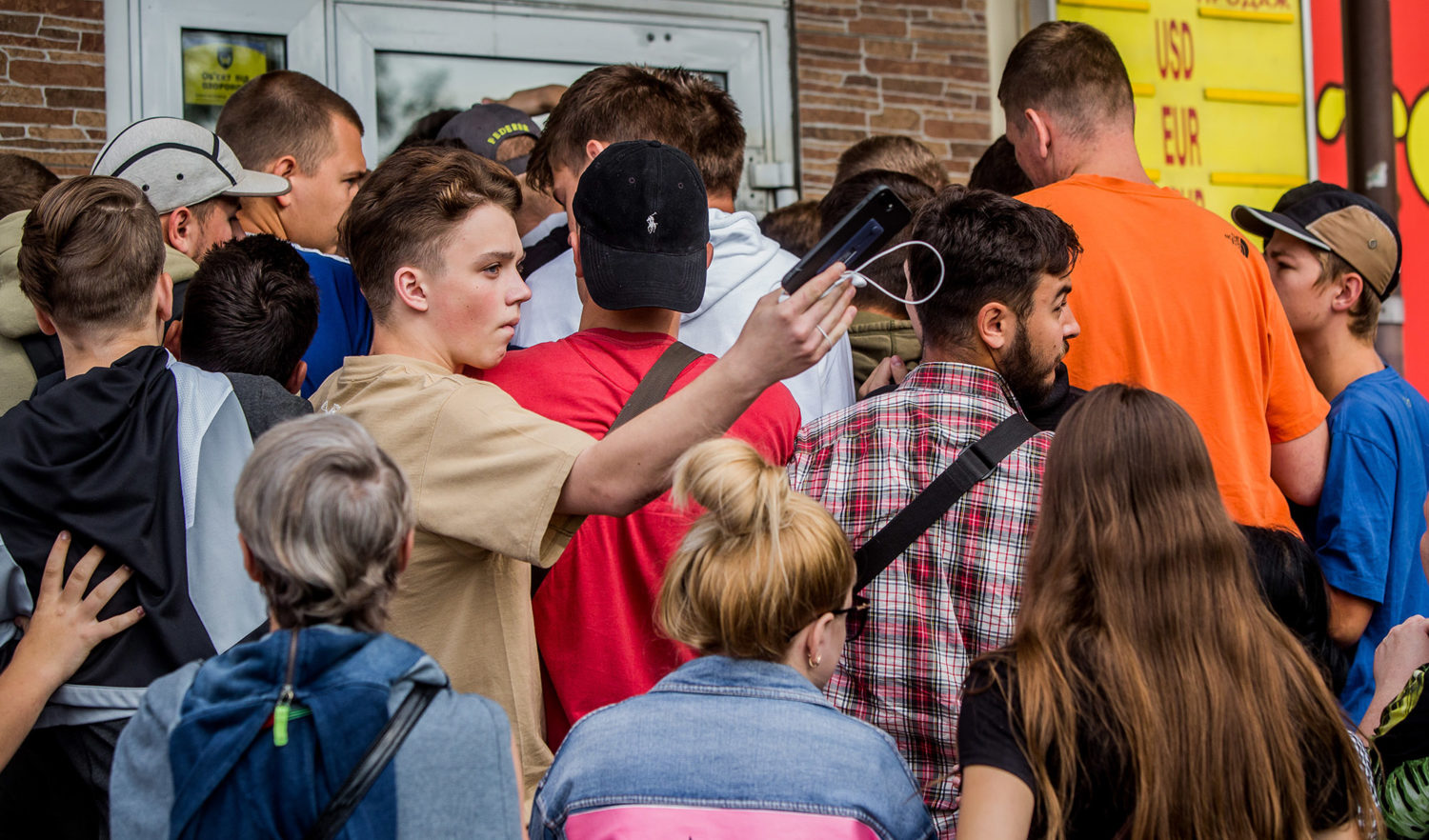
When VKontakte was banned, things got harder for the guys. But not much. Most of theirs are repeat customers. As a rule, they are hikers, climbers, travelers, and simply fans of recreation. Basically, anyone who doesn’t see a reason to pay $300 for new boots that they can buy from Roman for $50.
“It’s obvious that we only sell quality things. It happens rarely, but if a defect turns up after we’ve sold a piece, we give people their money back. We have a good reputation. Our customers like us.”
8:40 am. Everyone is still dispersed along the porch. No one is standing in line yet, but they’re not moving far away from the door either. They have the anticipation of sprinters at a start line. They’re nervous.
The false start couldn’t be avoided.
One dealer assumes the critical distance from the door. The rest see this move as the shot of the starting pistol and creep nearer. Roman and I join in. There’s a burr cut in front of me and moist breathing into my neck behind me. The line makes a half circle and sticks to the door like a swallow’s nest.
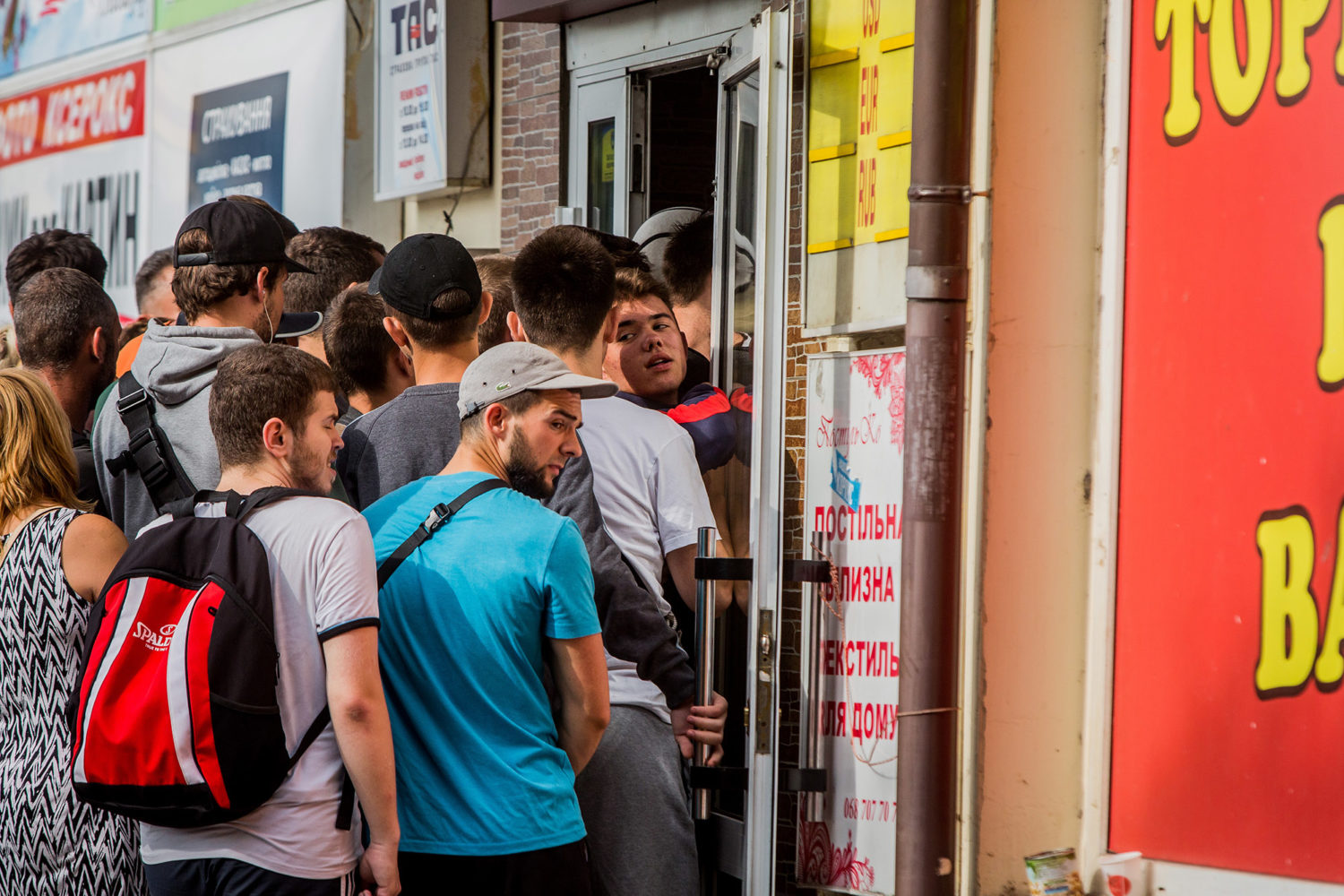
Some are holding large mottled bags at the ready.
It’s actually difficult to call this crowd a line. It is a nervous agglomeration with Brownian motion where everyone is trying to squeeze their shoulders past those in front and trample on the feet of those behind them. In a word, to gain a better position.
“Where the fuck do you think you’re going?
“Go fuck yourself.”
“I’ll fuck your mom instead.”
“C’mon, I was just kidding.”
8:50 am. The smell of asphalt mixes with the musty scent of missed showers. Suddenly the line sways. A few strong guys wedge their way closer to the door to the women’s grumbling and the men’s silence. Roman explains that they’re the ones who come right before the curtain.
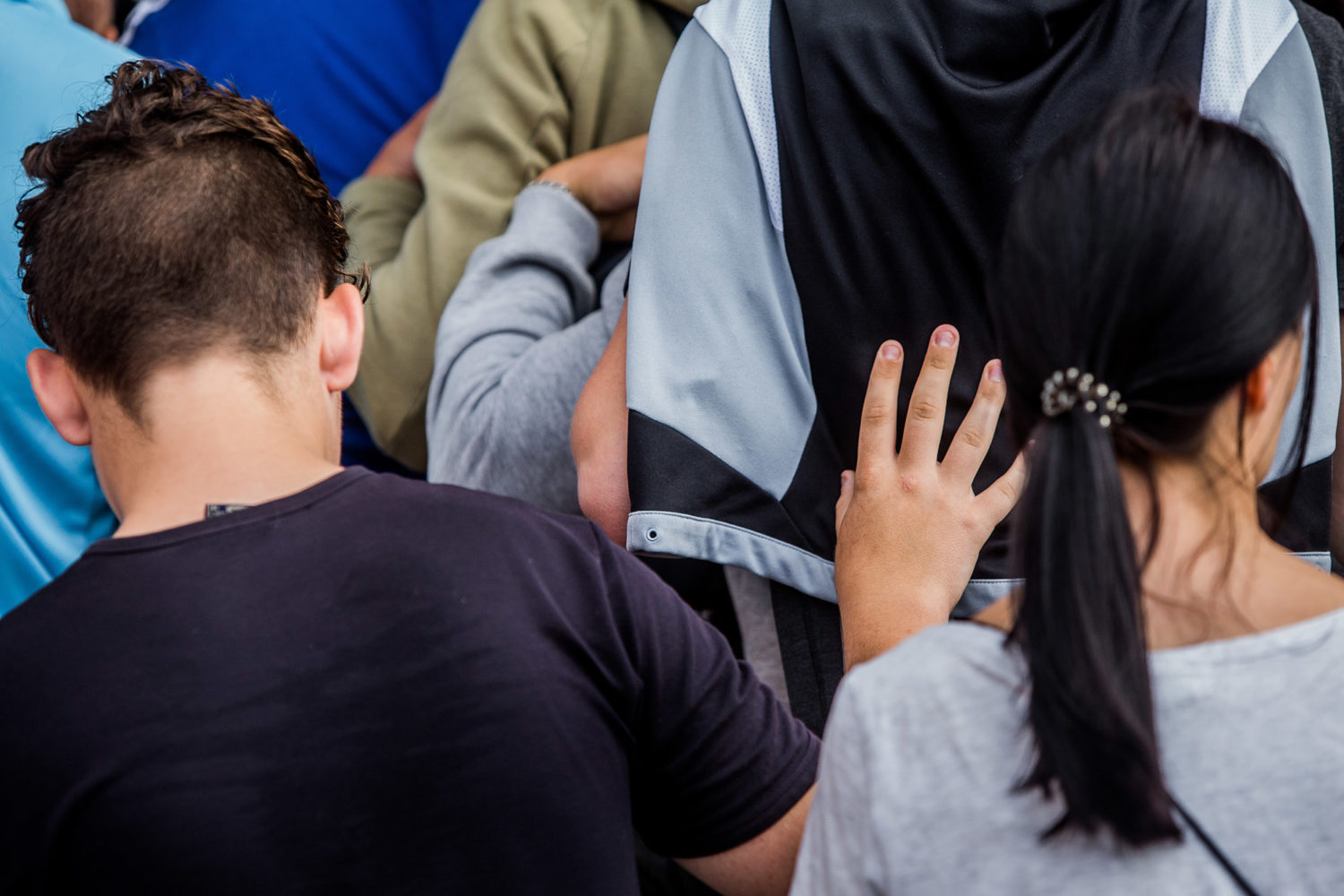
“That’s the youth for you, no respect at all!”
“They have reserved for us!”
“Lowlifes!” the woman just won’t stop. She is joined by a choir of voices not so bold.
“We won’t touch your bras, mama. There’s enough for everyone.”
“Go speak to your mother like that, you snot!”
“Hehe.”
The arc of the men’s strong backs cut off access to the door. The shop employees can barely make their way to work.
“Alright, I’m going to run for the clothes and you run to the very end of the room. That’s where the racks of shoes are,” Roman gives me his final instructions. “You’ll be my assistant today.”
8:58 am. The line rocks from side to side. I’m losing my footing and blindly feeling for the edge of the stairs with my foot.
9:00 am. Someone jerks at the door. There’s a push back. After a brief crush in the doorway the whole crowd surges inside. Right at the most important moment I completely lose my footing, but I’m carried in from behind.
When I reach the racks, the cream has already been skimmed off. All that remains are either size 47 flippers or a tiny 38 or simply junk. This is what Roman meant when he said that all the good stuff is scooped up 30 seconds after the delivery
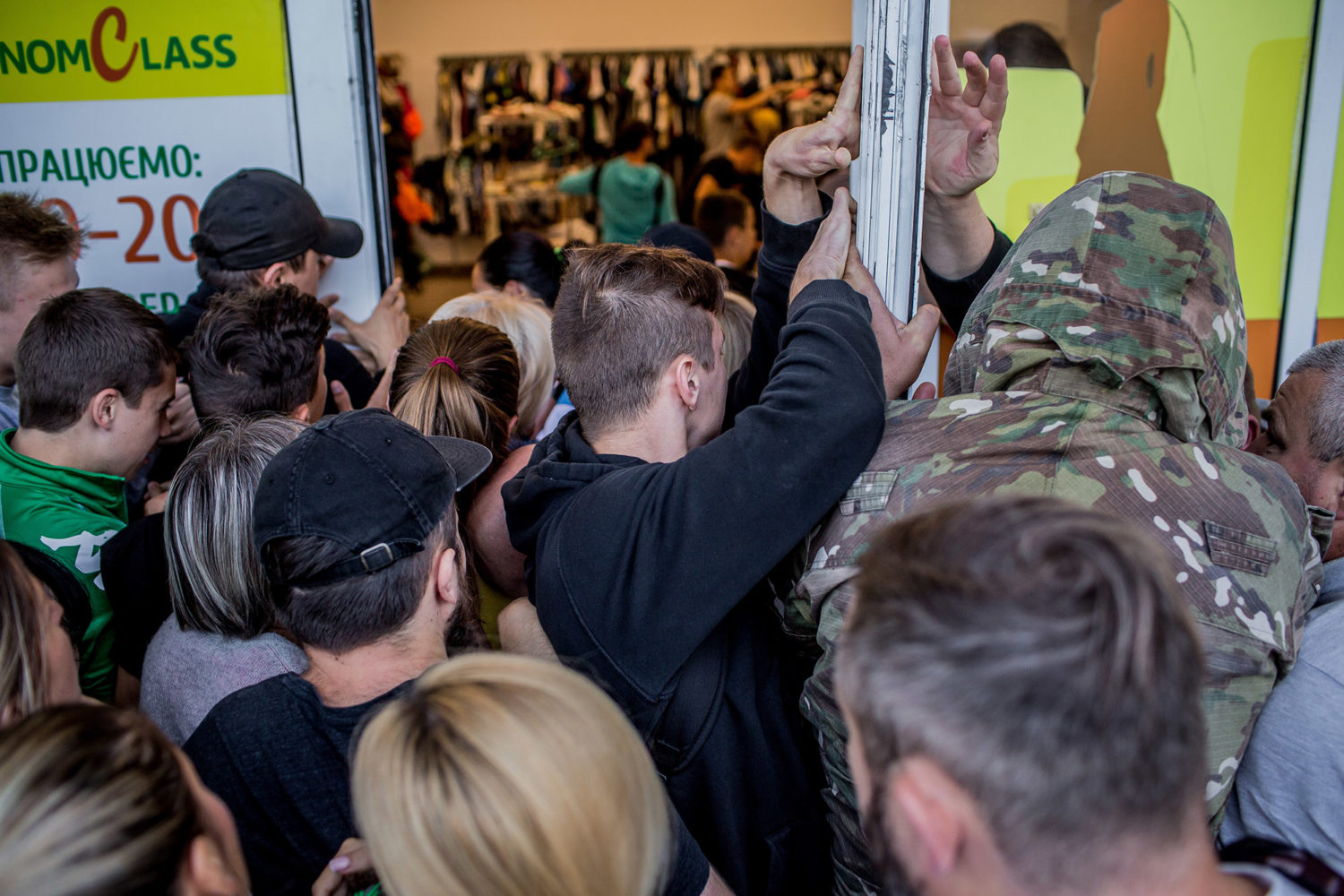
I race to the racks of shoes. I spot Roman out the corner of my eye. He’s sorting outerwear as fast as cash-counting machine counts bills.
When I reach the racks, the cream has already been skimmed off. All that remains are either size 47 flippers or a tiny 38 or simply junk. A guy next to me is happily trying on a pair of new Nike Air Maxes. A pair of Lacostes flashes white in another guy’s hands. This is what Roman meant when he said that all the good stuff is scooped up 30 seconds after the delivery. Dealers live by their feet.
9:10 am. Next to me a very tall woman in a bucket hat hurls a pair of black patent leather shoes on the rack. The yellow thread on the sole gives them away as Dr. Martens. Yep, they’re real. I try them on. They’re my size and not a scratch on them. At least there’s good thing; I’m not much of an assistant.
People move about the room, ramming into each other. Locusts in a jar. They are leafing through hangers with clothes like the pages of a dull book in search of illustrations. They throw the stuff they like onto the floor. There are piles of clothes everywhere. It stinks of sweat and disinfectant.
9:30 am. The hunt is over. Everyone assesses their haul. They carefully examine the stiches, bending and unbending the soles of shoes to make sure there aren’t any cracks. Cursing under their breath, they toss the defects to the side.
I find Roman checking the zipper on a down coat. He zips and unzips it up and down.
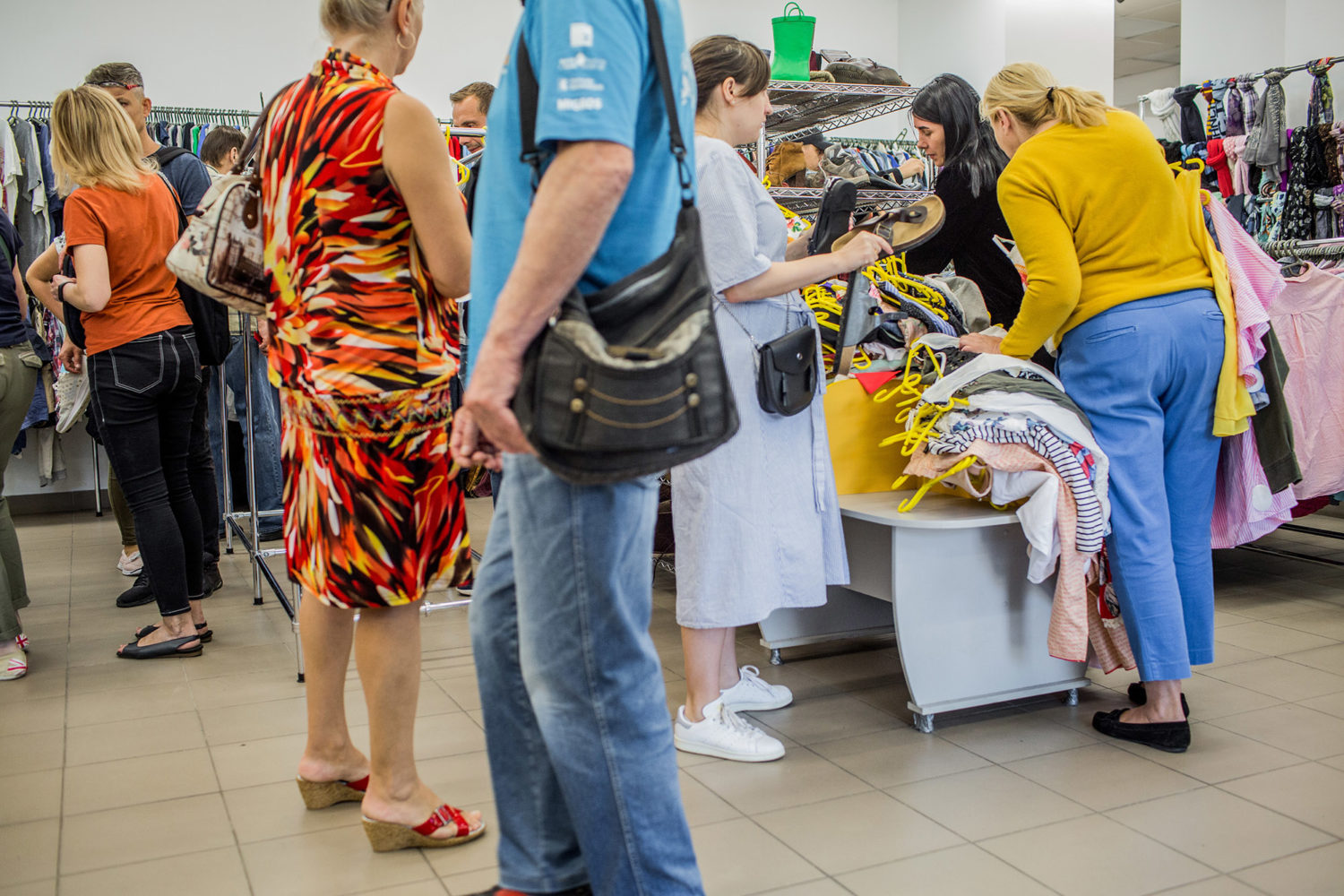
“Sweet,” he comments on my Martens.
Before I manage asking how he did, one of the “lowlifes” comes up to Roman. It’s the one who promised he wouldn’t touch the quarrelsome lady’s bras.
“Wow. How much?”
“It’s not for sale,” Roman answers.
“Can I hold it?”
The lowlife enviously stares at the inconspicuous olive-colored down jacket, carefully crumpling it. Tragically sighing, he gives it back to Roman.
“Three grand.”
“I said it’s not for sale.”
“Heck, no one will give you more for it.”
“Good,” Roman smiles. “I’ll wear it myself.”
But word has gotten out. The people flock to worship the coat. They look, they touch. They even try it on if Roman lets them, but he doesn’t let everyone.
“Hey you, double-X! What are you doing? You’ll stretch it out!”
The coat attracts a bunch of hungry looks. Here comes another pilgrim, with white swinish eyebrows and swastikas on his elbows.
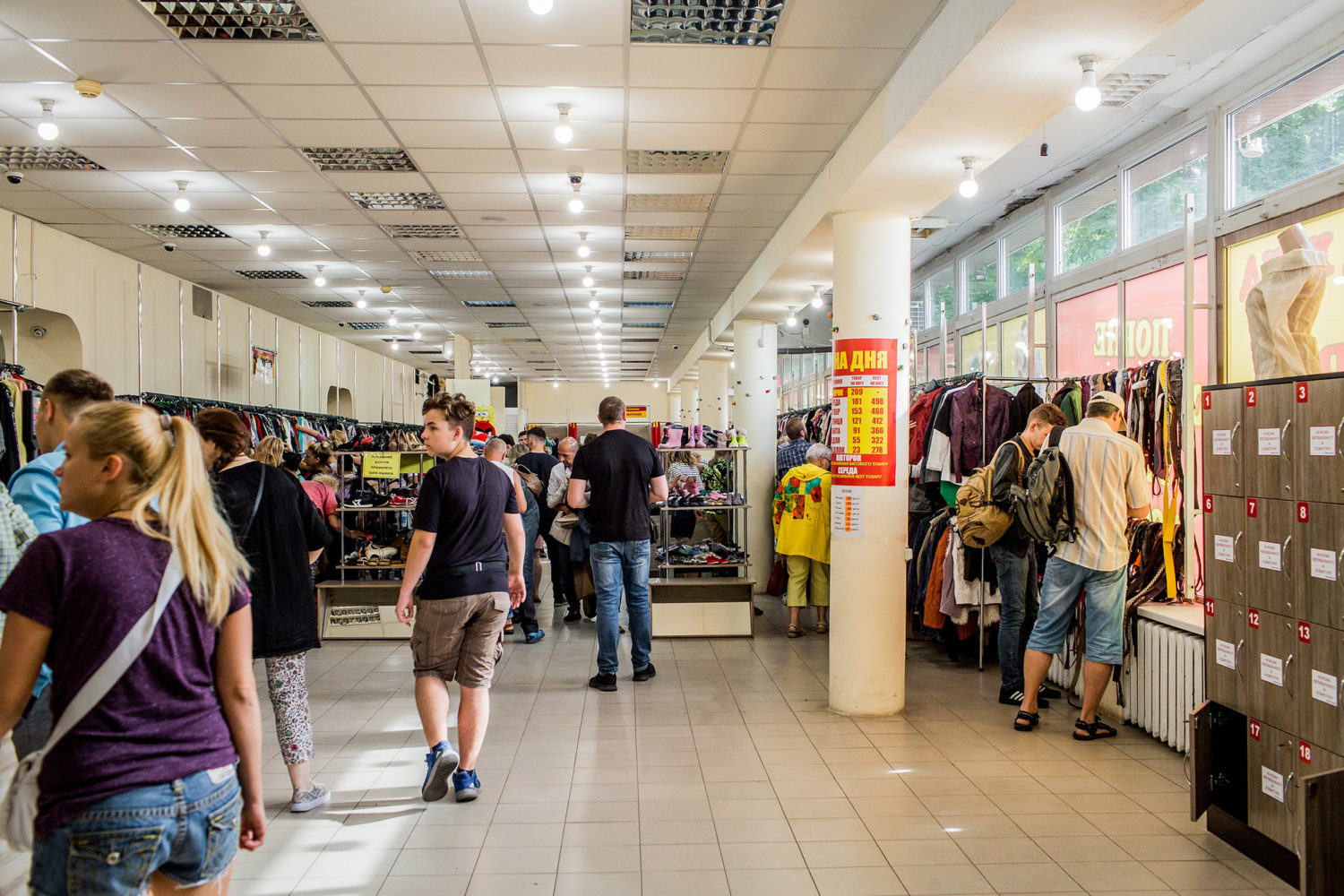
“Hey,” I don’t like his tone from the get-go.
“Hey,” Roman replies.
“How much for the Stoney?”
“It’s not for sale.”
“Cut the fucking crap! I haven’t touched your shit.”
“Touch it. Who’s stopping you?”
I picture what’s going to happen when it turns into a fight. The dude isn’t much bigger than me or Roman, but his sloping back puts me on alert. It’s not good, more like a boxer’s. Together Roman and I might do alright, but neither of us has a chance alone.
“You get that it’s a specialty?” he continues.
“You understand that you’re wrong.”
“How the fuck does it matter if I’m right or wrong?”
In the meantime, something’s happening at the check-out. The guard has got ahold of a vocational student who’s trying to get to the exit.
“You have no right!”
“Unzip your coat!” the guard shouts.
“Fuck you!”
Other kids are trying to free their friend, but a stout saleswoman comes between them as a dense barrier. During the scuffle, two t-shirts fall out from under the guy’s coat. He finally breaks free from the guard’s grip and runs for the door, but the women are hanging onto him. The guard meanwhile locks the door.
“Valia, call the police.”
The door is locked and the police are on their way, so the culprit is released to move about the store. There’s no escape. He looks around, restless like a beast in a cage. Suddenly he starts running in the opposite direction from the door. No one, not even his friends, understands why.
Until the student opens the window.
In the rush, he loses balance and falls backwards onto the street like a diver.
When the fuss dies down, the bull turns back to us. He hurls a t-shirt at Roman.
“Suck it!”
“Thanks,” Roman replies calmly like Mahatma Gandhi. The bull looks at us for a while and then bugs off.
“A bit annoying, isn’t it?” Roman says. “Where’d he come from, anyway?”
9:50 am. The guard explains the situation to the police who have arrived. There are lines at the cash registers and the dressing rooms. I help Roman hang up a few reject t-shirts. His haul: Mammut pants, Salomon hiking socks, and the cause of popular unrest—the Stone Island down coat.
We slowly make our way to the check-out.
“Well,” I ask Roman, “was it a good delivery?”
“It was okay. But the Stoney makes up for it.”
We check out. My Martens weighed 237 hryvnias’ worth. Roman pays almost 500 for his stuff. He’s in a good mood.
“The socks will go for 150 hryvnias. I’ll put the pants up for 500. And the Stoney can net 8 grand after it’s dry cleaned.”
“That’s not too much?”
“It’ll go in a half hour. They will even fight over it.”
After the stuffy store, the air on the street is especially delicious. Even if it tastes some asphalt.
“Have you ever thought about getting a normal job?”
Just what is a ‘normal job’ in your understanding? Office work five days a week from 9 to 6? Water from a cooler and a brown-bag lunch? Here at the thrift store there’s life, unpredictability, intrigue
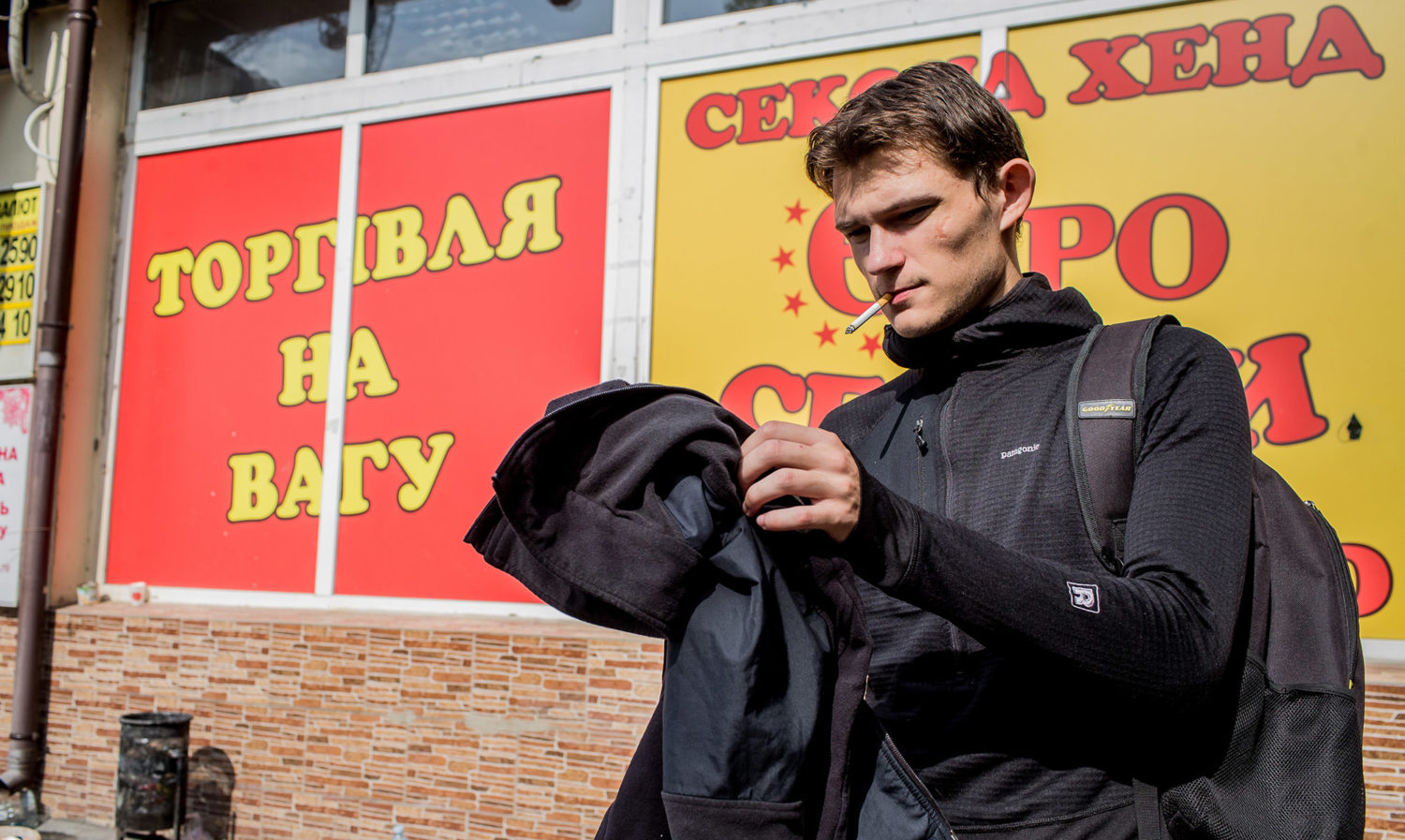
“Just what is a ‘normal job’ in your understanding?” Like I expected, my question gets Roman riled up. “Office work five days a week from 9 to 6? Water from a cooler and a brown-bag lunch? Free booze at office parties? You see, people are like animals—they can be divided into the wild and the tame. Here at the thrift store there’s life, unpredictability, intrigue. Sometimes there’s a shitty delivery, then another and another. You’ve got no money to pay the rent, finishing your dick off without salt. And then, bam, you find a Stoney. Or a pair of expensive Alpine boots. That’s more interesting than a stable check at the end of the month. Plus you’re your own boss. An idea pops into your head and in thirty minutes you can be on your way to the mountains. And when you get back, you work like a dog and don’t miss a single delivery. There’s this writer, Taras Prokhasko. He considers it his life’s greatest success that he doesn’t have to go to work.”
10:00 am. After the delivery, the shoppers don’t hang around the store long. They compare their catches, rejoice, and envy. Someone calls the guys from another thrift store to ask what the drudges got today. Everyone approaching us congratulates Roman on the Stone Island. But one is interested in my Martens. I let him try them on.
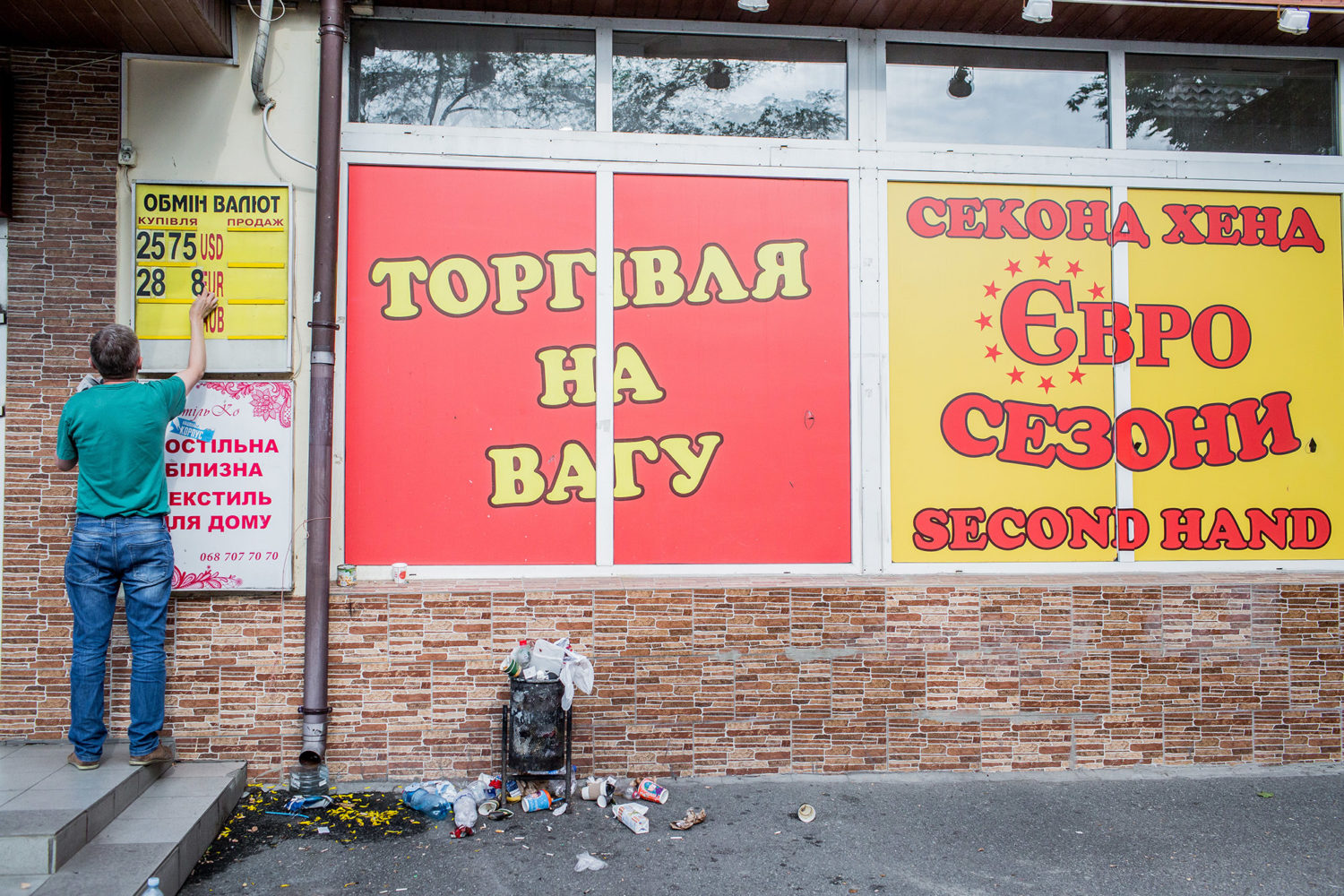
“Bro, I’ve been hunting them for six months. And they’re my size.”
“Hmm.”
“600 clams and a nice bonus to karma on top. What’d ya say?”
I look at Roman. He throws up his hands. I think for a moment: Do I really need a second pair of Martens, even if it is a different style?”
“One grand,” I say.
“Come on, at least knock off a hundred.”
“One grand.”
“Alright.”
The dude peels off ten hundreds and hands them to me. I give him the boots along with four of the bills. He breaks into a smile and thanks me. He’s practically skipping as he walks away from us. If he had a tail, he’d be wagging it.
“Good start,” Roman smiles. “You’ll go far.”
Translated by Ali Kinsella.
[This publication was created with support of the Royal Norwegian Embassy in Ukraine. The views and opinions expressed in this publication are those of the authors and do not necessarily reflect the official position of the Norwegian government].
Have read to the end! What's next?
Next is a small request.
Building media in Ukraine is not an easy task. It requires special experience, knowledge and special resources. Literary reportage is also one of the most expensive genres of journalism. That's why we need your support.
We have no investors or "friendly politicians" - we’ve always been independent. The only dependence we would like to have is dependence on educated and caring readers. We invite you to support us on Patreon, so we could create more valuable things with your help.
Reports130
More






